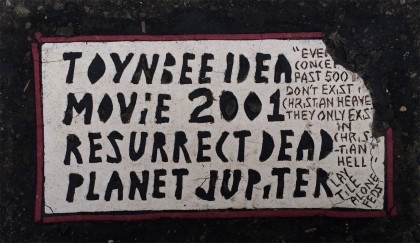January 23, 2014
Line 6 on Thursday announced a new amp it is calling AMPLIFi. While the amp was just announced today, I’ve been using one for the past couple of weeks to test it out.
AMPLIFi is an interesting blend of an amplifier and a hi-tech music system. The amp has all of the knobs you would expect a traditional amplifier to have, but it’s also Bluetooth-enabled so you can connect your iPad to the amp wirelessly.

This is where the real magic of AMPLIFi comes from. While connected to the amp you can scroll through more than 200 different amps and effects, changing the sound of the hardware unit. You can also save any preset you make directly to the amp and recall it at any time.
AMPLIFi has a unique design that guitar players will like. Unlike most modeling amps—even older Line 6 models—there is no screen to make adjustments on the hardware itself. Without the iPad app, AMPLIFi looks and feels just like a traditional amp, although you can still change presets by pressing a button on the hardware or changing with a foot pedal.

I have the 150 watt version of the amp and it is loud. You could easily gig and rehearse with the amp, but that’s not really what I think it’s main purpose is. AMPLIFi has a couple of more cool tricks built-in.
On the iPad app if you tap to play a song, it will automatically suggest tones from Line 6’s Custom Tone library. You tap the tone you want and it is automatically sent to the amp, giving you a sound just like the song you are practicing. In my tests, this worked pretty good. Of course, tones change depending on the guitar you are using, but it was close enough to get you started.
The other feature that I really liked was the Blend knob. This is a custom volume knob that also allows you to blend in the volume of the music you are playing along with. Because AMPLIFi is also a music system, the songs being played through the amp sound incredible. If the volume of the guitar is too low, you just push down the volume knob, which activates the blend feature, allowing you to turn up the guitar to match the volume of the song you are playing.

Learning new songs, whether you’re an experienced pro or just starting out, can be a pain in the ass. Songs are recorded differently, so you have to keep adjusting the volume to get it right. Because the blend knob is using the music system and amplifier of AMPLIFi, it’s a matter of seconds to get the volume matching set correctly.

If I had one complaint about AMPLIFi, it would be with the iPad app. Line 6 went for a flat design is the app—in my opinion, they went too flat. Music is one of those places that skeuomorphism really works and Line 6 has always done a great job designing their apps using representations of the amps and effects. This new iPad app is kind of bland for my liking.
I understand why they made the design choices they did, but I think there are ways they could have held on to the coolness and still designed a functional app for users.
Having said that, the app works great. You can access all of the controls of the amp, effects, signal chain and even the Blend knob from the app without ever touching the amp.
AMPLIFi Remote is compatible with iPod touch (5th generation), iPhone 5s, iPhone 5c, iPhone 5, iPhone 4s, iPhone 4, iPad (3rd and 4th generation), iPad Air, iPad 2 and iPad mini.
Overall, I loved AMPLIFi, both as a guitarist and from a technology standpoint. The 75 watt version costs $399 and the 150 watt model is $499. This is an amp I’ll be using a lot.
Written by Dave Mark
The mechanics of this particular scam are fairly sophisticated. Most readers would be cautious enough to avoid this trap, but even so, this is worth a read.
Bill Gates is on a PR tour to promote the latest edition of the Gates Letter, the annual missive from the Gates Foundation detailing the current focus of the foundation. This year’s letter is called “3 myths that block progress for the poor”. Take a few minutes to read it. No matter your opinion of Bill Gates and Microsoft, this stage of his life is being well spent, in service to others.
One of his recent appearances was on Jimmy Fallon’s show. He spoke about his foundation, about ridding the world of diseases like polio, then Bill started talking about his vision for the future of computing. At some point (about 1:30 in the video if you want to skip ahead), Bill got a little distracted by something on Jimmy’s desk. Something not made by Microsoft. Pretty funny.
Written by Dave Mark
When Ian Fleming created the James Bond character, he equipped him with a .25 calibre Beretta M418. Avid Bond fan Geoffrey Boothroyd objected to this choice (too light, limited stopping power) and wrote a letter to Fleming:
I have, by now, got rather fond of Mr. James Bond. I like most of the things about him, with the exception of his rather deplorable taste in firearms. In particular, I dislike a man who comes into contact with all sorts of formidable people using a .25 Beretta. This sort of gun is really a lady’s gun, and not a really nice lady at that. If Mr. Bond has to use a light gun he would be better off with a .22 rim fire; the lead bullet would cause more shocking effect than the jacketed type of the .25.
May I suggest that Mr. Bond be armed with a revolver?
Great story.
Written by Dave Mark
Users of flagship smartphones such as Apple’s iPhone 5s and Samsung’s Galaxy S4 are continuing to suck down more data than their tablet-wielding counterparts, according to a large-scale survey of mobile data consumption in 2013 conducted by JDSU (which last year bought mobile data analytics company Arieso, the company that previously ran the annual survey).
Is there something about the evolution of the architecture of mobile phones that makes later models consume more data? Is there a correlation to the adoption rate of the most recent OS rev? In other words, the latest model of a phone enables faster transmission speeds and typically runs the latest OS. Or is there something more complex at work here?
January 22, 2014
Fender’s Allen Abbassi gave me a demo of the 60th Anniversary Strat. What a beautiful guitar.
[wpvideo kzu3hBzZ]
Written by Jim Dalrymple
While at NAMM, Jim joins Dan and special guest Merlin Mann to talk about their favorite Macs new and old, the future of the computer in the home, the power of portable and wearable devices, amps, guitars, Yamaha’s purchase of Line 6, new gear, why Jim isn’t getting a new Mac Pro, and more.
Sponsored by OmniGraffle (use code for % off), Harvest (use code 5BY5 for 50% off), Hover (use code BEARD for 10% off your first purchase), and Shutterstock (use code DANSENTME114 for 25% off).
Written by Jim Dalrymple
This is a new site from Russ Hughes, the man behind Pro Tools Expert. Russ has turned Pro Tools Expert into the must-go-to site for everything Pro Tools and is now turning his attention to Logic Pro. Russ won’t be doing the new Logic site on his own—he’s turning to Dennis Van Den Driesschen, who is the founder of the popular Danski’s Logic Pro Blog. It’s certainly going to be interesting to see if Russ and Dennis can turn the new Logic site into something as big as Pro Tools Expert. With their history, I’m betting they can.
Written by Dave Mark
This is great. A family kept a mysterious note from their grandmother for 20 years. The note was a series of letters, clearly some sort of code. Try as they might, they could not decipher this last message from grandma. So they posted it online. 15 minutes later, they had their answer.
I don’t want to spoil the surprise, so I won’t post the resolution here. Read the thread from top to bottom. See if you can work out the puzzle before you get to the end of the thread.
Written by Dave Mark
The shuttle buses that transport workers for huge tech firms like Google, Facebook, and Apple between San Francisco and Silicon Valley every day have come under heavy fire lately, but today a vote was passed unanimously on a pilot program that the city hopes will help ease those tensions. In front of a meeting room packed full with journalists and citizens, the San Francisco Municipal Transportation Agency (SFMTA) just approved a proposal that will see commuter shuttle buses pay to share approximately 200 spots with city buses.
Companies that operate the buses will soon have to pay $1 for every stop they make, every day, to the SFMTA — amounting to about $1.5 million over the 18-month pilot (set to start in July 2014). The agency won’t earn any profit from the money it collects, though; instead, it’ll use the fees to cover the new permit program, enforcement, and further evaluation of the pilot. Prior to today, Silicon Valley shuttles typically would use SFMTA bus stops throughout the city without express permission, leading to potential traffic snarls — as well as a sentiment that these companies were taking advantage of the city without giving anything back.
This seems fair and, hopefully, will satisfy both sides.
Written by Dave Mark
In a summary judgment order entered late on Tuesday (January 21, 2014), Judge Lucy Koh, the federal judge presiding over two Apple v. Samsung patent cases in the Northern District of California, found Samsung’s Android-based devices to infringe an Apple patent on word recommendations (autocomplete) and declared a Samsung patent on multimedia synchronization invalid.
This spells trouble for Samsung.
Prior to this ruling, Apple and Samsung were asserting five patents each in this two-way patent spat that started in 2012, roughly a year after the worldwide dispute between the two market leaders broke out in the same district (it subsequently turned out into a global battle with filings in ten or more countries). After the summary judgment decision, Apple still has five patents in play, one of which has just been found infringed (leaving to the jury only Samsung’s invalidity defense), while Samsung is down to four patents.
The trial begins on March 31.
Written by Dave Mark
This is a fascinating interview with Raffi Krikorian, Vice President of Platform Engineering at Twitter.
Ever wonder how many tweets go out at any given time? Or what event caused the biggest traffic burst ever recorded at Twitter? This was a surprise to me:
So what you’re referring to is the Castle in the Sky event is what we call it internally, and that was a television show that aired in Tokyo. We did our new record of around 34,000 tweets a second came into Twitter during that event. Normally, Twitter experiences something on order of 5,000 to 10,000 tweets a second, so this is pretty far out of our standard operating bounds.
An interesting read, even if you are not a systems architect.
Written by Dave Mark
Peter Cohen goes back in time (OK, not really!) to revisit his favorites of 30 years of Macintosh.
My personal favorite? No question, it’s the Macintosh IIci. I remember it well. Jean-Louis Gassée was the head of Macintosh development. He wore a fashionable diamond earring, and I believe he took personal pride in rolling out this particular model. Of all the Macs, either before or since, I found it the easiest to take apart and put back together. It was just so well designed.
I am awash with nostalgia. Sniff.
Written by Dave Mark
Bill Murray is a national treasure. And now he answers all your questions in this Reddit “Ask Me Anything”.
Written by Dave Mark
Where do the ethical obligations of journalism kick in? If you are a blogger, does that make you a journalist? Do you have an obligation to double-check your sources to verify the accuracy of everything you post?
Julie Strietelmeier, a self-professed “tech geek writer” got an email from a reader, telling a story that started when a friend wore his Google Glass into a movie theater (they were prescription lenses) and detailed his detainment by homeland security. Follow the headline link and read the story. It’s worth it.
The details of the story aside (it really is a chilling read), there are two things that really jumped out me.
As this post already asked, what obligations did the writer have before posting the story online? Lots of bloggers ran with it before Julie felt pressed to verify the details. In a sense, she was coerced into behaving like a journalist. I’m in a similar boat. I don’t have the resources to ferret out news stories. I read a lot, and post stories I find compelling, thought provoking, or just fun. When I can, I do some basic fact checking to make sure what I post passes my own internal truth detector, but I am more of a scientist than a journalist. My own sense of journalistic integrity comes from wanting to do a good job, wanting to get it right, not from any sort of official journalism-school training.
The second thing that stood out was the fact of wearing Google Glass into a movie theater. Some people might say, this is an obvious no-no. Google Glass can record video, and wearing it into a theater is asking for trouble. True. But get used to it. In some small number of years, the ability to record will be so incorporated into our clothing and our bodies, movie theaters will either have to close, or the movie industry will have to accept a certain level of piracy as a given.
January 21, 2014
Written by Shawn King
Gizmodo:
Can you spot the fakes? Hundreds of amazing images wash over our greedy eyeballs each and every day, clogging our Twitter timelines and Facebook feeds. Many of them are fakes, lies, or both. Like these!
I’m seeing more and more of these being passed around Twitter. Even worse, being passed around by people who should know better.
Written by Dave Mark
Pretty cool little story.
On February 4, 1968, Lizzie Bravo was quite possibly the most surprised human being on earth. It seemed like another routine “waiting to see the Beatles” day, when all of a sudden Paul McCartney emerged and walked toward the group of thrilled young ladies. Paul asked the assembled female fans if any of them could hold a high note.
Lizzie, and another groupie named Gayleen Pease, quickly volunteered. As the other girls watched in disbelief, Lizzie and Gayleen were taken inside Abbey Road studios. The girls’ fantasy of fantasies was about to come true- they were not only going to see and meet the Beatles, they were going to sing on a Beatles song!
I love a good ad. This one is all about the car chase. Obviously scripted, a cracking good spot nonetheless.
I just spent the last three days in New York. Walking in mid-town, I encountered something that really threw me for a loop. I saw an actual, real-life Toynbee Tile.
From the Toynbee Tile Wikipedia page:
The Toynbee tiles (also called Toynbee plaques) are messages of unknown origin found embedded in asphalt of streets in about two dozen major cities in the United States and four South American capitals.[1][2] Since the 1980s, several hundred tiles have been discovered. They are generally about the size of an American license plate (roughly 30 cm by 15 cm), but sometimes considerably larger. They contain some variation on the following inscription:
TOYNBEE IDEA
IN MOViE `2001
RESURRECT DEAD
ON PLANET JUPITER
Some of the more elaborate tiles also feature cryptic political statements or exhort readers to create and install similar tiles of their own. The material used for making the tiles was long a mystery, but evidence has emerged that they may be primarily made of layers of linoleum and asphalt crack-filling compound.
The tiles appear overnight and no one knows who puts them in the street. They are a true mystery. Here’s a picture of the one I found:

As you can see in the picture (click on it for an embiggered version), the tiles are actually embedded in the asphalt. Astonishing. There’s actually a documentary on the Toynbee Tiles, called Resurrect Dead. The trailer for it is below. I want to believe!
January 20, 2014
Written by Jim Dalrymple
Matt Gemmell:
So I’m going to try this. Maybe it’s foolish, and from a commercial point of view it certainly looks that way, but I must try. As of this moment, I’m no longer developing software, either for myself or for others. I’m writing full-time.
Matt is one of the few writers on the Internet that I truly enjoy reading. I’m really looking forward to reading more.


























